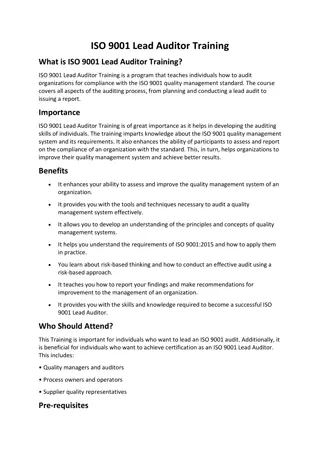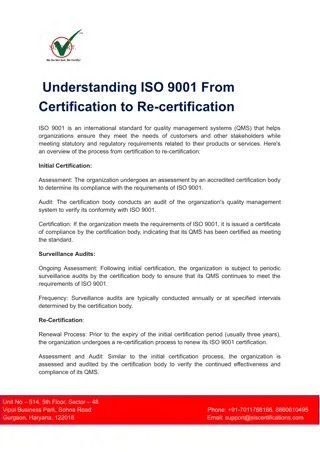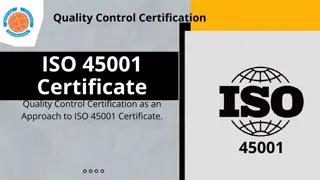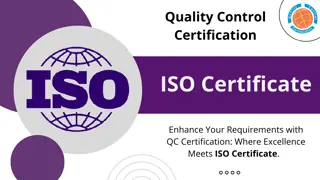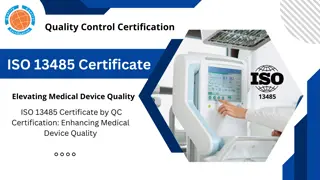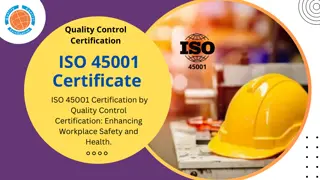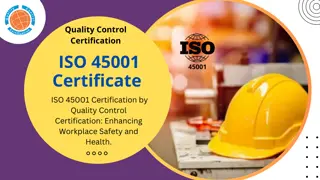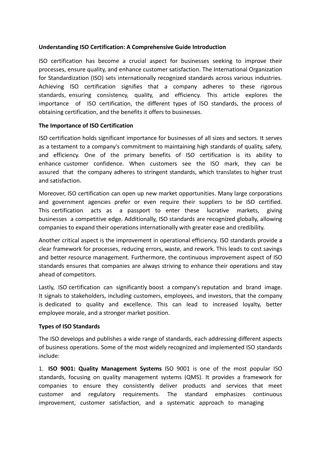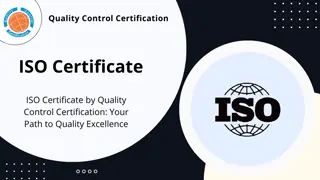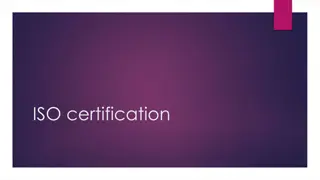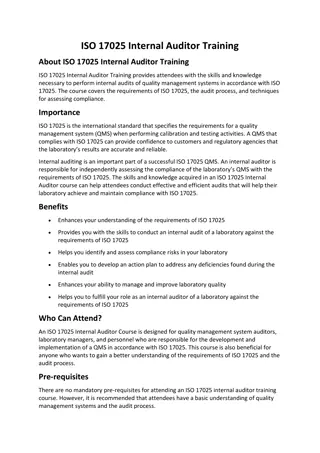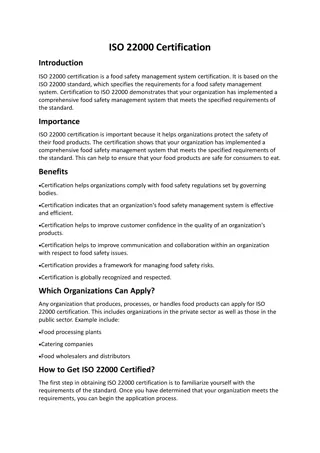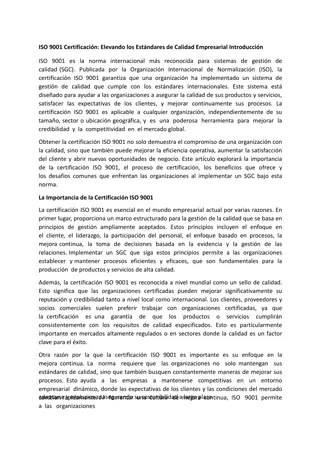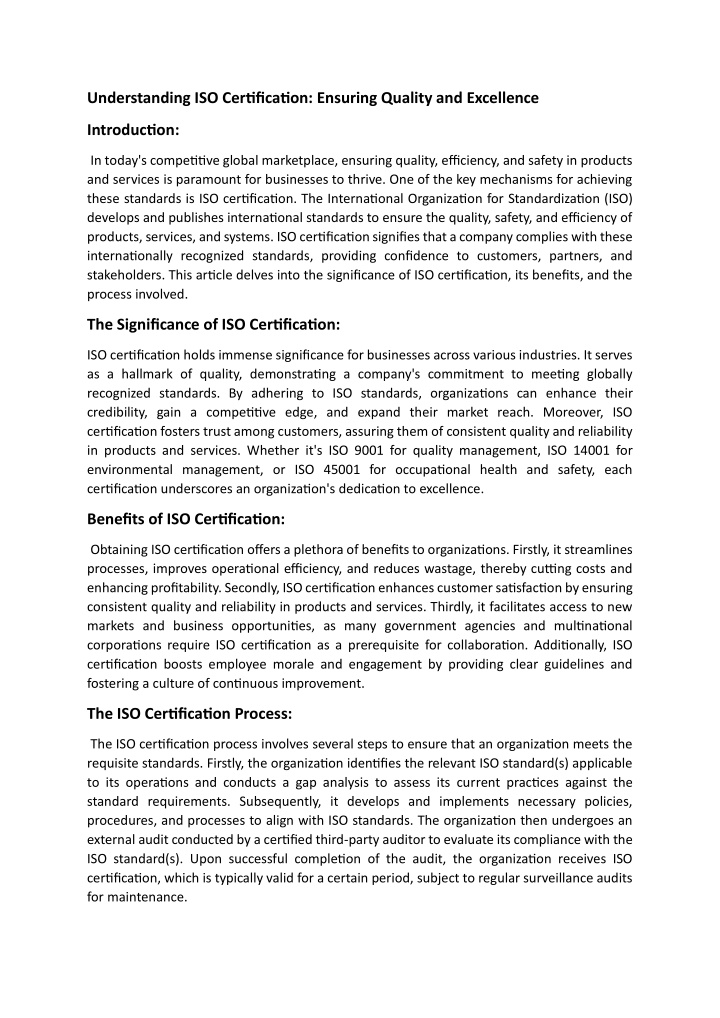
what is ISO certification
What is ISO certification? This is a question that many business owners and managers have, but donu2019t know how to answer. ISO certification can be a confusing topic, but it doesnu2019t have to be. In this blog post, we will provide a beginneru2019s guide to ISO certification and what it means for your business. We will also discuss the benefits of getting certified and how to go about the process.nn
Download Presentation

Please find below an Image/Link to download the presentation.
The content on the website is provided AS IS for your information and personal use only. It may not be sold, licensed, or shared on other websites without obtaining consent from the author. If you encounter any issues during the download, it is possible that the publisher has removed the file from their server.
You are allowed to download the files provided on this website for personal or commercial use, subject to the condition that they are used lawfully. All files are the property of their respective owners.
The content on the website is provided AS IS for your information and personal use only. It may not be sold, licensed, or shared on other websites without obtaining consent from the author.
E N D
Presentation Transcript
Understanding ISO Certification: Ensuring Quality and Excellence Introduction: In today's competitive global marketplace, ensuring quality, efficiency, and safety in products and services is paramount for businesses to thrive. One of the key mechanisms for achieving these standards is ISO certification. The International Organization for Standardization (ISO) develops and publishes international standards to ensure the quality, safety, and efficiency of products, services, and systems. ISO certification signifies that a company complies with these internationally recognized standards, providing confidence to customers, partners, and stakeholders. This article delves into the significance of ISO certification, its benefits, and the process involved. The Significance of ISO Certification: ISO certification holds immense significance for businesses across various industries. It serves as a hallmark of quality, demonstrating a company's commitment to meeting globally recognized standards. By adhering to ISO standards, organizations can enhance their credibility, gain a competitive edge, and expand their market reach. Moreover, ISO certification fosters trust among customers, assuring them of consistent quality and reliability in products and services. Whether it's ISO 9001 for quality management, ISO 14001 for environmental management, or ISO 45001 for occupational health and safety, each certification underscores an organization's dedication to excellence. Benefits of ISO Certification: Obtaining ISO certification offers a plethora of benefits to organizations. Firstly, it streamlines processes, improves operational efficiency, and reduces wastage, thereby cutting costs and enhancing profitability. Secondly, ISO certification enhances customer satisfaction by ensuring consistent quality and reliability in products and services. Thirdly, it facilitates access to new markets and business opportunities, as many government agencies and multinational corporations require ISO certification as a prerequisite for collaboration. Additionally, ISO certification boosts employee morale and engagement by providing clear guidelines and fostering a culture of continuous improvement. The ISO Certification Process: The ISO certification process involves several steps to ensure that an organization meets the requisite standards. Firstly, the organization identifies the relevant ISO standard(s) applicable to its operations and conducts a gap analysis to assess its current practices against the standard requirements. Subsequently, it develops and implements necessary policies, procedures, and processes to align with ISO standards. The organization then undergoes an external audit conducted by a certified third-party auditor to evaluate its compliance with the ISO standard(s). Upon successful completion of the audit, the organization receives ISO certification, which is typically valid for a certain period, subject to regular surveillance audits for maintenance.
Challenges and Considerations: While ISO certification offers numerous benefits, organizations may encounter challenges during the certification process. Implementing changes to meet ISO standards requires significant time, resources, and commitment from all levels of the organization. Resistance to change, lack of awareness, and inadequate resources can impede the certification process. Moreover, maintaining compliance with ISO standards necessitates ongoing monitoring, training, and investment in infrastructure and technology. Therefore, organizations must carefully assess their readiness and allocate sufficient resources before embarking on the ISO certification journey. Conclusion: In conclusion, what is ISO certification plays a pivotal role in ensuring quality, efficiency, and safety in products and services across diverse industries. By obtaining ISO certification, organizations demonstrate their commitment to excellence, gain a competitive advantage, and foster trust among stakeholders. However, achieving and maintaining ISO certification requires careful planning, dedication, and resources. Despite the challenges, the benefits of ISO certification far outweigh the costs, positioning certified organizations for long-term success and sustainability in today's dynamic business environment.


